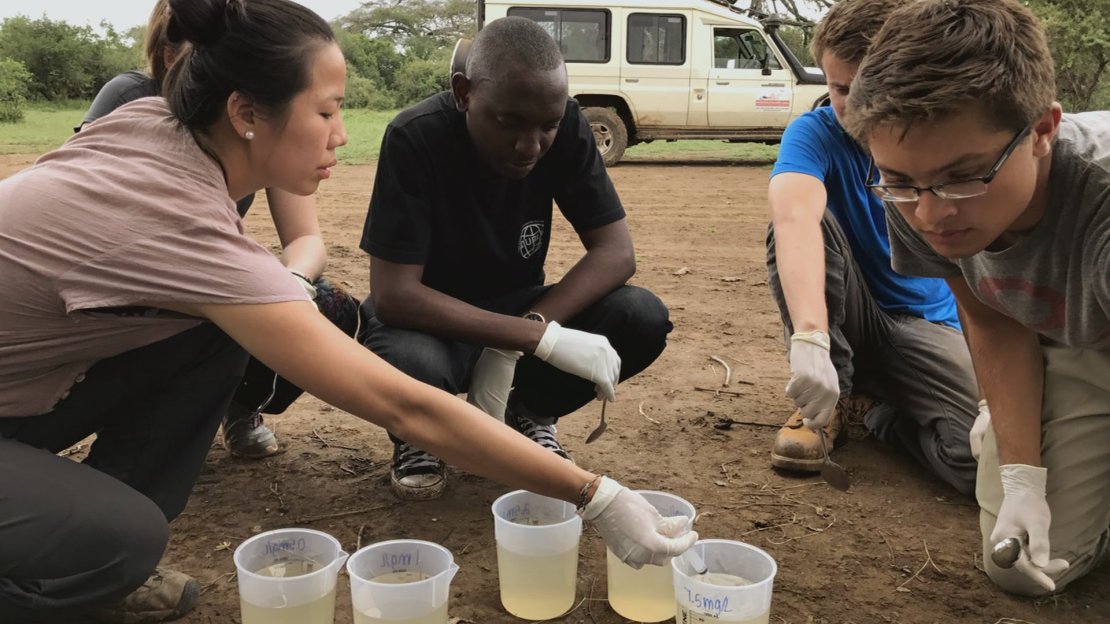John Tolley, May 4, 2019
Do you really think much about water? When you?re thirsty, is it there? When you need to bathe or wash your clothing, is it there? As Ohio State civil engineering alum Josh Osam-Duodu explains, that is a luxury, but one that clouds our worldview.
?Water is so expected here,? says Osam-Duodu. ?You don?t think about it. You turn on the faucets, you expect water to flow out, but in other parts of the world, that is not the case. A lot of people have to go through the worst conditions to get water that?s not even clean.?
One of those places is the rural village of Marwa, in the Kilimanjaro region of Tanzania. There women and young girls trek vast distances carrying heavy buckets to supply this vital resource. It?s a burdensome task that interferes with nearly all aspects of their lives.
?Bringing water [to Marwa] allows the people not to have to walk miles and spend their whole day trying to bring water just to survive,? explains Randall Berkley, a Maji Marwa team member and graduate student in the Global Engineering Leadership program at Ohio State. ?It allows them to better their lives: kids can go to school; moms can start their own businesses and really just advance their whole lives.?
Marwa?s chief, or chairman, recognized the detrimental effects of this task and reached out to a local nongovernmental organization to find a solution. In short order, that group contacted representatives at The Ohio State University?s College of Engineering for help.
Beginning in 2015, Buckeye faculty and students established the service-learning project Maji Marwa - Swahili for Water for Marwa - to create a suite of manageable water systems to alleviate Marwa?s deficit. In 2017, the group designed and installed an initial system for rainwater harvesting and storage.
This system, though never intended to fully meet the village?s needs, helped solve some of their immediate problems, such as water for childbirth. It also helped the group create a good will with Marwa?s residents and allowed the Maji Marwa team to work alongside local craftsmen who make up an important part of the installation crew and who will largely be responsible for day-to-day upkeep of the systems.
For Ohio State civil engineering alum Jasmine Johnson, who traveled to Marwa in 2017 as part of her senior capstone project, the trip was an eye-opening experience. Before departing, students spend time learning about the local culture and studying basic Swahili in order to communicate effectively with their hosts.
?It surprised me how welcoming everyone there was,? says Johnson. ?Even if we couldn?t speak to each other directly and had to have a translator, everyone was just thankful that we were there. I learned a lot about their culture when I was there and just seeing the whole community together was really awesome because you knew that you were helping this entire community.?
This summer, Maji Marwa is returning to Tanzania to install another rainwater collection and storage system. But the group?s larger goal is to begin the initial stages of a project that will see 23 miles of pipeline running to the Pangani River, which flows from Mount Kilimanjaro.
?We intend to supply water using the river that supplies the village currently,? says Osam-Duodu of the group?s plan. ?There?s an inlet at the river where the water is taken and essentially flows to a treatment facility. From that treatment facility the water is pumped to different storage points and then from the storage points pumped to distribution points where the villagers can access the water.?
While there is still quite a way to go when it comes to bringing clean, reliable water to Marwa, the impact of Maji Marwa is already being felt, and not just for the community but for the Ohio State students involved as well.
?The mission of this project is phenomenal, bringing water to that community,? says Berkley. ?They?re just working through their day trying to get water. To bring them water would be something that would just probably be one of the greatest things I?ve ever done in my life.?







 See what's coming up live on B1G+ every day of the season at BigTenPlus.com.
See what's coming up live on B1G+ every day of the season at BigTenPlus.com. 